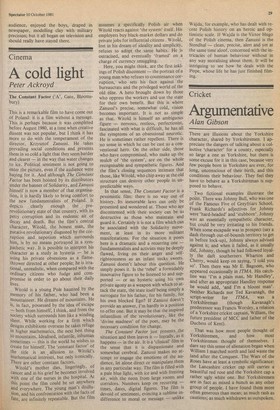Cinema
A cold light
Peter Ackroyd
The Constant Factor ('A', Gate, Bloomsbury) This is a remarkable film to have come out of Poland: it is a film without a message. This is perhaps because it was completed before August 1980, at a time when creative dissent was not popular, but I think it has more to do with the temperament of the director, Krzysztof Zanussi. He takes prevailing social conditions and presents them in so cold a light that they seem harder and clearer — in the way that water changes to ice. Political sentiment is not going to enter the picture, even if the audience were baying for it. And although The Constant Factor has been hoisted by its distributors under the banner of Solidarity, and Zanussi himself is now a member of that organisation, it is hardly likely to bring comfort to the new fundamentalists of Poland. It depicts clearly enough the prerevolutionary state of that country, with its Petty corruption and its endemic air of decay and death. But the film's central character, Witold, the honest man, the Putative revolutionary disgusted by the corruption and nepotism which surrounds him, is by no means portrayed in a sympathetic way. It is possible to interpret his character as a study in hysteria — he is using his private obsessions as a flamethrower directed at other people; he is irrational, unrealistic, when compared with the ordinary citizens who fudge and compromise in order to go about their daily lives.
Witold is a young Pole haunted by the memory of his father, who had been a mountaineer. He dreams of mountains. He is, in fact, possessed by the idea of escape — both from himself, I think, and from the society which surrounds him like a winding sheet. While working for a firm which designs exhibitions overseas he takes refuge in higher mathematics, the next best thing to mountains. Idealised, infantile, inhuman sometimes — this is the world he wishes to create for himself. The 'constant factor' of the title is an allusion to Witold's mathematical interests, but only iconically. There are other constant factors.
Witold's mother dies, lingeringly, of cancer and in his grief he becomes involved With one of the nurses in the hospital. At this point the film could be set anywhere and everywhere. The young man's disillusion, and his confrontation with the facts of fate, are infinitely repeatable. But the film assumes a specifically Polish air when Witold reacts against 'the system' itself. His employers buy black-market dollars and do private jobs for influential citizens . Witold, lost in his dream of ideality and simplicity, refuses to adopt the same habits. He is ostracised, and eventually 'framed' on a charge of currency smuggling.
Here, you might think, are the first inklings of Polish discontent — the portrait of a young man who refuses to countenance corruption, who sets his face against the bureaucrats and the privileged world of the old elite. A hero brought down by those who oppress the workers and use the state for their own benefit. But this is where Zanussi's precise, somewhat cold, vision becomes important. It is not as simple as that. Witold is himself an ambiguous figure — nervous, restless, perfectionist, fascinated with what is difficult, he has all the symptoms of an obsessional neurotic. He is sometimes rather repellent. There is no sense in which he can be cast as a conventional hero. On the other side, those who have compromised, who make up the mulch of 'the system', are on the whole recognisable and sympathetic figures. And the film's closing sequences intimate that those, like Witold, who chip away at the old structure can destroy other people in unpredictable ways.
In that sense, The Constant Factor is a pessimistic film: there is no way out of history. Its inexorable laws can only be presented and wondered at. Those who are discontented with their society can be as destructive as those who maintain and guard it. Certainly it is not a film which can be associated with the Solidarity movement, at least in its more militant manifestations. For the situation it poses here is a dramatic and a recurring one — fundamentalists and activists may be deeply flawed, living on their anger and selfrighteousness as an infant sucks sweets. Zanussi doesn't labour this question. He simply poses it. Is the 'rebel' a formidably innovative figure to be listened to and supported — or an hysteric using his own private agony as a weapon with which to attack the state, the state itself being simply a surrogate for his father, for his family, for his own blocked Ego? If Zanicssi doesn't provide an answer, I'm hardly in a position to offer one. But it may be that the inspired infantilism of the revolutionary, like the 'divine madness' of the poet, may be the necessary condition for change. The Constant Factor just presents the situation and then leaves it — literally, as it i happens — in the air. It is a 'clinical' film n the sense that it is dispassionate and somewhat cerebral. Zanussi makes no attempt to engage the emotions of the audience, let alone direct or manipulate them in any particular way. The film is filled with a pale blue light, with ice and with freezing air, with the neon from large rooms and corridors. Numbers keep on recurring — times, dates, digital figures. The film is devoid of sentiment, evincing a sublime indifference to moral or message — unhke
Wajda, for example, who has dealt with recent Polish history on an heroic and optimistic scale. If Wajda is the Victor Hugo of the Polish cinema, then Zanussi is the Stendhal — clean, precise, alert and yet at the same time aloof, concerned with the intricacies of human behaviour without in any way moralising about them. It will be intriguing to see how he deals with the Pope, whose life he has just finished filming.






































 Previous page
Previous page